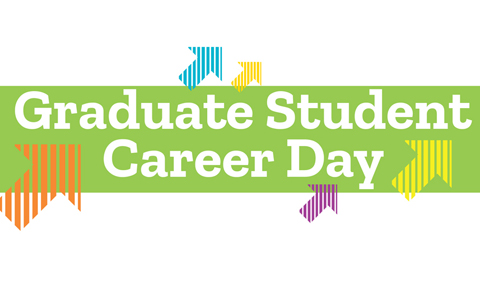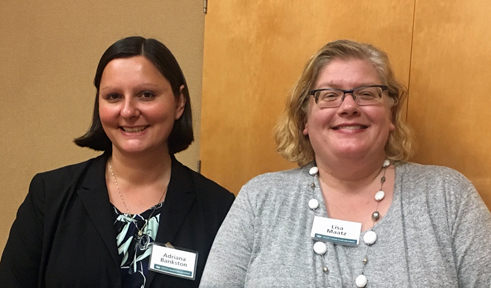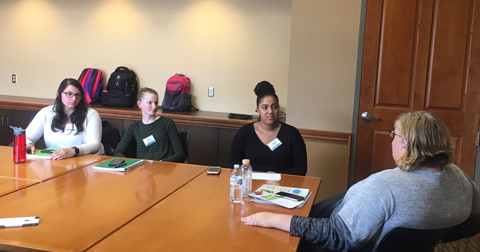“Successful professionals don’t just specialize in one thing. The more you are able to broaden your perspective and scope, even if you have an area of expertise, the better off you’ll be,” said Lisa Maatz (’89) at the College of Arts & Sciences Graduate Student Career Day.
Maatz, who majored in Sociology, Political Science and Women’s, Gender & Sexuality Studies at Ohio University, said there was a great deal of “synergy between these three disciplines” that helped prepare her for a career in policy work.
Like Maatz, today’s graduates need to demonstrate their ability to work successfully across multiple disciplines; they also benefit from incorporating digital humanities into their scholarship in order to obtain a competitive edge. Combined, these talents help students learn how to develop their entrepreneurial skills. These topics–and much more–were the subject of conversation at the College of Arts & Sciences Graduate Student Career Day, which featured a variety of panels, information sessions, and opportunities for student-alumni interaction and networking.
Kristen Lillvis (’06, M.A. English) used the concept of “digital humanities” to discuss interdisciplinary collaboration.
“Digital humanities requires you to search for people with whom you might collaborate,” she said. “Talk with your librarians and from people in anthropology, geology, business, and other fields. Explain what you work on, and seek out people whose work is slightly related to yours. In what ways might you work together?” Lillvis said.

The featured panelists at the Oct. 5 event included Adriana Bankston, Kristen Lillvis, Lisa Maatz, and John Glazer—as well as a LinkedIn/Handshake information session with Kacey Schaum.
- Connect with Adriana Bankston, Lisa Maatz, John Glazer, Kacey Schaum, and Silvana Duran Ortiz on LinkedIn.
The Grad Student Career Day also featured a 3-Minute Thesis competition, hosted by Silvana Duran Ortiz. Duran Ortiz, a doctoral student in Biological Sciences and Molecular and Cellular Biology, won first place in February’s 3-Minute Thesis competition for her presentation, “Can we extend life- and health-span by decreasing growth hormone action?”. Duran Ortiz shared her winning entry and explained the benefits of participating in the competition.
Dr. Joseph Shields, Interim Dean of the College of Arts and Sciences, encourages master’s and doctoral students to sign up for Ohio University’s February 2019 3-Minute Thesis Competition. All must be available to participate in one of the semi-final rounds (either Monday, February 11, 2019 or Wednesday, February 13, 2019) and the final round, Tuesday, February 19, 2019.
Shields also encouraged students to “expand [their] thinking about career opportunities” and to focus on “practical tools one can leverage to be successful in whatever path one chooses to pursue.”
He notes from his own experience that a poor academic job market did not cause him to regret or rethink his doctoral degree in Astronomy.
“My Ph.D. experience equipped me with analytical skills, project management and presentation skills, and marketing experience, because I had to ‘sell’ my ideas to others,” Shields states. “Remember, you may have a well-defined plan, but circumstances can change in unexpected ways, and I hope the Grad Student Career Day will give you perspectives on how to think about the range of possibilities and practical strategies for advancing your career.”
Lisa Cohen, the Director of External Relations for the College of Arts and Sciences, concurs.
“This event is a pilot to help graduate students explore other career pathways and innovative opportunities to consider while still in school,” she states. “Our goal is to help students learn more about campus services and career support at OHIO.”
Defining and Practicing Digital Humanities
Digital humanities, the subject of Lillvis’ presentations, represents an area of rapid growth in the academic job market. She defines digital humanities as “using technology to help us answer questions about the world.” Interdisciplinarity is a hallmark of this field.
In her own work as an Associate Professor of English and Director of Digital Humanities at Marshall University, Lillvis has partnered with scholars from across many disciplines and colleges.
“Every facet of what I do is interdisciplinary. Partnering with colleagues from different departments and colleges opens up not only new ideas but also new sources of funding,” Lillvis explained.
Lillvis recently competed in the “Design for Delight” Competition, sponsored by Intuit, in which she teamed up with scholars from business, communication studies, and computer science. Their task was to resolve the problem of substance abuse, with no limitations on what the solution might be. Lillvis’ team designed a virtual reality education curriculum, complete with sunglasses that served in a pinch as a rapid prototype.
“Our team members from business helped us determine what was possible, while the computer science members worked on the technicalities of virtual reality. I worked with the communication members to think about the language associated with the proposal and what we might name it,” Lillvis said.
The team won the competition and was flown to Silicon Valley, where they met with leaders from Facebook, Google, and other cutting-edge tech corporations.
Regina Yoong Yui Jien, an English literature Ph.D. student, attended Kristen Lillvis’s talk, “Innovating the Humanities” and found it both engaging and useful.
“Lillvis showed new ways to think about the field of literature. Her talk sparked new ideas situating Emily Dickinson (my poet of interest) in a transnational, multimodal setting. Branching from more traditional ways of talking about literature, Lillvis suggested new collaborations with other fields, especially computer science, as part of the emerging field of digital humanities,” Yoong said.
The Art and Science of Policy Work
“To me, we can’t talk about political science and sociology without thinking about gender. Gender should always be part of the discussion in order to get the whole picture. In international relations, for example, there have to be women at the table in order to create jobs, distribute relief, and improve education. That’s not exclusionary of men—if our approach is intersectional, it’s going to be more successful and help more people,” Maatz said.
Maatz is a policy adviser and advocate for women and girls in Washington, D.C., and at OHIO. She was featured in the book Secrets of Powerful Women, and she is a contributor to Love Her, Love Her Not: The Hillary Paradox, a bipartisan anthology named an Amazon “#1 Hot New Release.”
Like Lillvis, Maatz noted the importance of working with multiple departments and colleges, as well as with people who work outside of academia, in order to broaden one’s knowledge base.
“That’s what Arts & Sciences is all about. By definition, it is interdisciplinary and a critical thinking home base. In today’s world, we have to think critically. An Arts & Sciences degree is hugely important because it teaches you to research and analyze, and those skills are essential in today’s world,” she remarked.
Maatz also emphasized the importance of developing a good working relationship with one’s academic adviser early in an undergraduate career and maintaining that relationship as one progresses in school. She also advises students to take advantage of services on campus, such as the Career and Leadership Development Center.
Wide Range of Services Available at CLDC
Graduate and undergraduate students who are interested in building their professional profile and preparing for the job market are encouraged to visit the Career and Leadership Development Center, where they can request assistance with career coaching, leadership coaching, mock interviews, résumés, cover letters, and more.
Students who need professional clothing for job interviews, conferences, career fairs, and other professional engagements are also encouraged to visit OHIO’s Career Closet, where they can make an appointment to browse and keep donated clothing at no cost.





















Comments